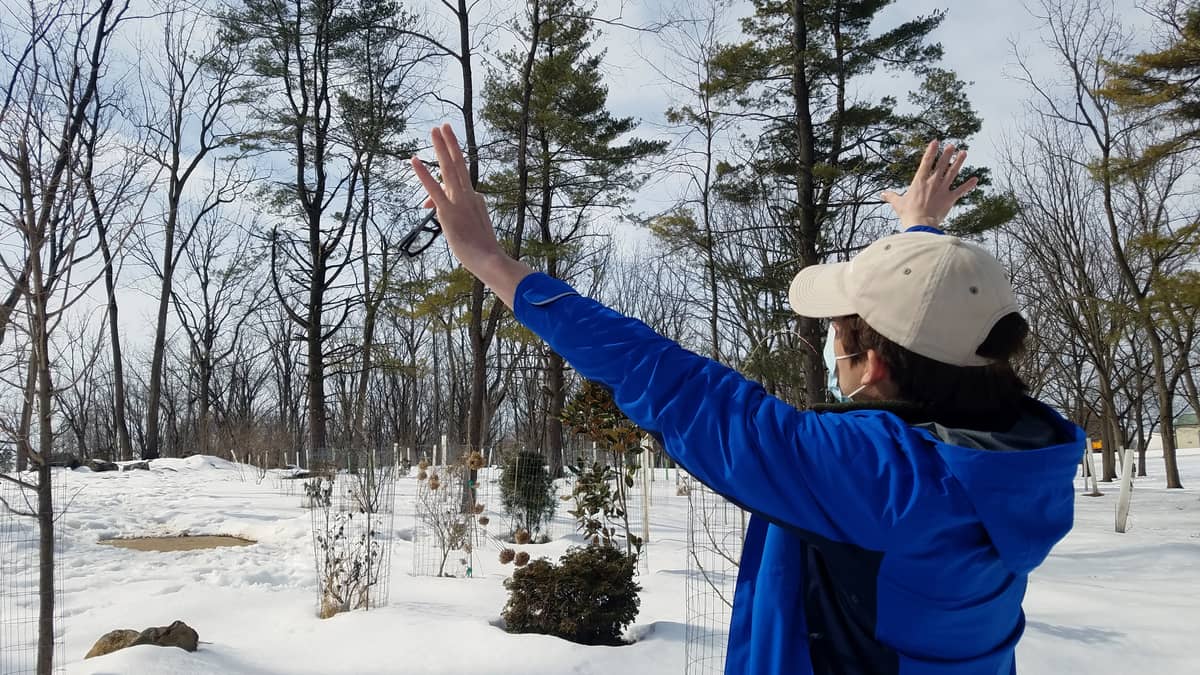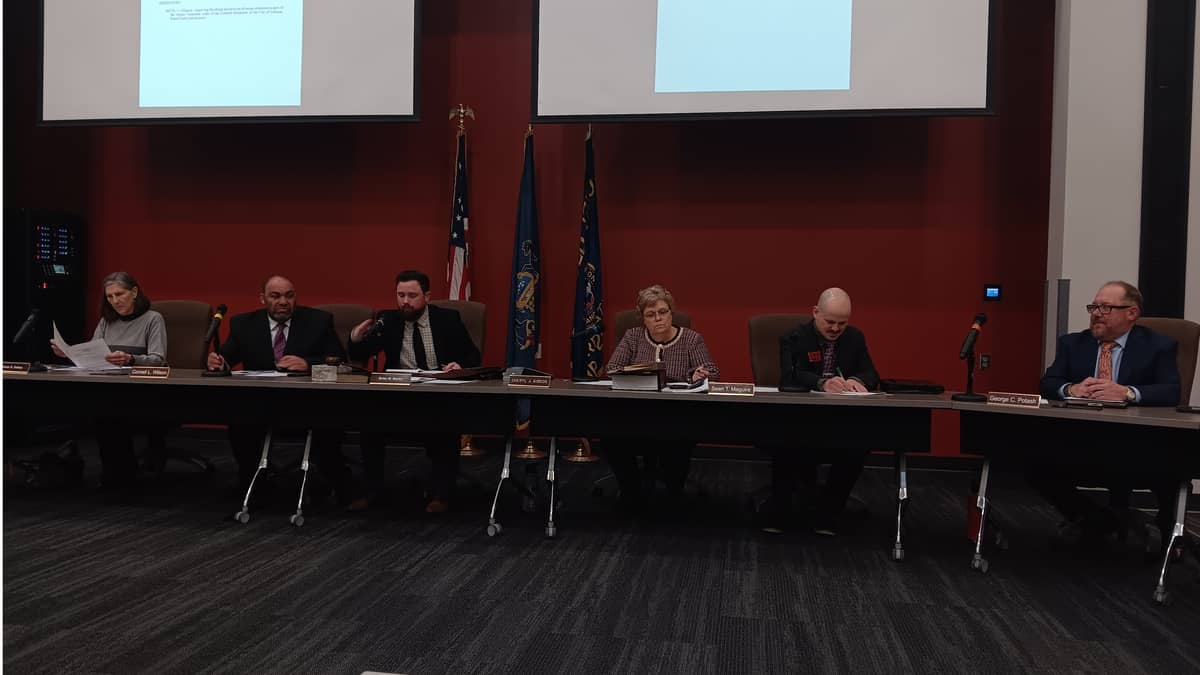In nature and in life, death is inevitable. But after death, the process of renewal can begin.
Chris Black, a 29-year-old Lebanon man, has been planting and tending to trees in South Hills Park, just south of the city of Lebanon, for several years.
Black’s focus in the park has primarily been on a small area of woodland on the southern edge of the park’s boundary with the Lebanon VA property. It’s in the midst of the park’s disc golf course, a fact that Black has had to take into consideration when deciding where and what trees to plant — some species can take a frisbee hit better than others.
The grove, now planted from its initial two-year design, was prompted by the sudden loss of Chris’s older brother, Alex Black, a professional arborist.
“I could make a bush look beautiful. [Alex] could make an entire 100-foot-tall tree look beautiful,” Chris said in an interview with LebTown. “My brother was an arborist. For me, it’s just a deep passion.”

Chris began planting in the park in spring of 2018 after gaining permission from South Lebanon Township, which put him in contact with park manager Mike Kipp. But the direction and scope of his work in the park changed drastically when Alex died in a work accident on December 6 of the same year at the age of 31.
Shortly after Alex’s death, Chris approached Kipp with a new vision for the area. It would become a grove of dawn redwoods, a tree that held a special significance for Alex.
Alex had at one point been hired to remove a dawn redwood that, according to Chris, was supposedly one of the oldest specimens in the country. Though Alex attempted to find a way to save the tree, he ultimately ended up cutting it down. However, seeds from the tree were preserved.
It’s these same seeds that Chris has grown into the young saplings in South Hills Park.
Rebuilding after loss
Chris had initially cut down a patch of tree-of-heaven, an invasive species best known for its association with the spotted lanternfly, before planting the new grove.
“This whole area was overtaken,” Chris said, referring to the tree-of-heaven grove that is now stumps and fallen timber among the saplings. “They seed prolifically. They love poor soil, rich soil, anything.”
But Black had noticed that the delicate ecosystem that had been there had been effectively reduced to mud. Though the invasive tree species had been removed, it has still sustained a small community of plant life and small critters like salamanders. Something had to replenish the felled woodland.
For Black, the experience mirrored his process in dealing with grief. “Here you had the foundation wiped clean. Now you’re starting from zero. That’s basically what it’s like to lose someone you really love,” he explained.
The idea to plant the redwood seeds in the park was a “no-brainer.” “[Redwoods] are very easy to grow. My success rate with them is very high,” Black said.
The dawn redwood is a fast-growing deciduous conifer tree native to east Asia. It’s a relative of the larger coastal redwood and giant sequoia trees famously found in California. First identified as part of the fossil record, living specimens were found in China in the 1940s and the tree became a transplant around the world. It’s identifiable by its large symmetrical pyramid-like shape.
Though both tree-of-heaven and dawn redwoods are fast-growing nonnative species, the latter is considered to have little invasive potential.

Besides the redwoods, which comprise about 100 of the 200-plus trees planted by Black, each tree in the park has its own story. Some have been transplanted from Black’s home nearby, others have been taken from private property after Black has gotten the permission of the landowner. Many of them were found in the garbage heap of nurseries; Black is often able to get a good deal by buying up the trees that nobody else wanted.
After Alex’s death, Chris poured his energy into the redwoods and the park. He estimates that, over the years, he’s spent thousands of dollars and over a thousand hours on work in the park. “Some weekends were 10 hours a day. Some workdays were 6 hours a day,” Chris said, referring to the time commitment to the project.

But the numbers aren’t important — “I don’t think of any of this as ‘time.’ I think of it as a necessity, like drinking or eating.”
“The tree that he tried to save saved me. It gave me purpose. When you learn the news of that loss, and you’re at a loss yourself, you think ‘What can I do?’ That’s where time — every second — becomes crucial.”
“It’s an ever-changing thing, whether its the design of a project or it’s grief,” Black added. “You hope that two years goes by and you don’t think, ‘I didn’t do anything.'”
Fortunately, dawn redwoods happen to be a particularly good species to track growth by.
“It’s not one of those trees that you look at and go, ‘What has changed from year to year?'” Black said. “Depending on the soil you have, it can grow 3 to 5 feet per year — maybe more.” According to Black, the trees are capable of reaching 60 feet in about 15 to 20 years.
Anticipating the future

Both Alex and Chris graduated from Lebanon High School, a short distance away from South Hills Park. “My brother had moved away when he was 18, had been doing his own thing for 13 years, figuring out life, being an arborist and really loving it,” Chris said.
Chris, nearing 30 years old, has reflected on the time that’s passed since his brother’s death. The loss of Alex prompted the realization that knowledge of the time one spends on Earth is limited and may be cut off sooner or later than expected. It’s become part of his philosophy to life; one of Chris’s favorite proverbs is the reminder that “the best time to plant a tree was 20 years ago.”
Though the grove has come together quickly from its original two-year plan, the passage of time has still been difficult. “The hardest thing about loss is that the more that time goes on, the more you don’t know what that person would or would not say anymore,” Chris said. He describes Alex as his other half; they shared the kind of relationship in which both people know instinctively what the other is thinking.
Years or even decades from now, Black hopes that the grove will be a sanctuary. And if there’s a name that’s attached to the grove, he wants it to be Alex’s. “My name was never meant to be the focal point anyway,” he said. A plaque will be installed at the grove, and Chris hopes that, at the minimum, someone will read it someday and think “he must have meant something to someone.”
Besides the dawn redwoods, the plants are a mix of species that Black has picked out in the hopes that they will pique visitors’ curiosity. There are magnolias, Japanese umbrella trees, hydrangeas, several kinds of cypresses, and ginkgos, among others. “If any of this can truly inspire someone, that’s the big takeaway,” Black said.
“As it gets older, it’s only going to get more and more special.”

As for Black’s current plans in South Hills, he’s hoping to establish another new grove at the other side of the park and continue planting. Beyond Lebanon County, he also wants to plant a tree in every US state and every country on the planet.
“We’ve really got lightning in a bottle right now,” Black said of his fellow park workers. “Everyone took me under my wing. They became friends, true friends. It was a really beautiful thing.”
“The thing with trees is that we can’t appreciate them as much because they’re not moving in the same time as us,” Black concluded. “The tree is staying put. But it’s growing, it’s moving, just at a different rate.”
“With the dawn redwood, it’s one of those trees that you can live and grow with at the same time, because it is growing so fast. It’ll really turn your head.”

South Hills Park is closed for the winter until March 22. To see the grove, visit the disc golf course in South Hills Park, accessible from a lot at 40 State Drive. Take the left path down the hill into the trees.
This article has been updated with a clarification on the number of dawn redwoods in the park. About 45 of the redwoods have been propagated from the original tree, but 100 or so redwoods are in the grove in all.
Questions about this story? Suggestions for a future LebTown article? Reach our newsroom using this contact form and we’ll do our best to get back to you.

Support local journalism.
Cancel anytime.
Monthly Subscription
🌟 Annual Subscription
- Still no paywall!
- Fewer ads
- Exclusive events and emails
- All monthly benefits
- Most popular option
- Make a bigger impact
Already a member? Log in here to hide these messages
Local news is disappearing across America, but not in Lebanon County. Help keep it that way by supporting LebTown’s independent reporting. Your monthly or annual membership directly funds the coverage you value, or make a one-time contribution to power our newsroom. Cancel anytime.

























